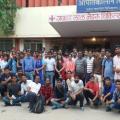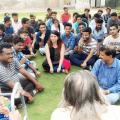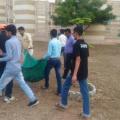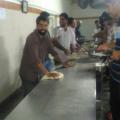About Us
The National Service Scheme covers students at the level of higher education. Thus the administrative structures of the higher education have the responsibility of looking after NSS and its implementation at the university level. The successful functioning of NSS cell at University level will give impetus for proper implementation of NSS in the unit level.
Aims & Objective
Aims
The overall aim of National Service Scheme as envisaged earlier, is to give an extension dimension to the higher education system and orient the student youth to community service while they are studying in educational institution. The educated youth who are expected to take the reins of administration in future are found to be unaware of the problems of the village/slum community and in certain cases are indifferent towards their needs and problems.
Therefore it is necessary to arouse the social conscience of the students, and to provide them an opportunity to work with the people in the villages and slums. It is felt that their interaction with the common villagers and slum dwellers will expose them to the realities of life and bring about a change in their social perception.
Objectives
The broad objectives of NSS are to:
- Understand the community in which they work
- Understand themselves in relation to their community;
- Identify the needs and problems of the community and involve them in problem solving process;
- Develop among them a sense of social and civic responsibility;
- Utilize their knowledge in finding practical solution to individual and community problems;
- Develop competence required for group living and sharing of responsibilities;
- Gain skills in mobilizing community participation;
- Acquire leadership qualities and democratic attitude;
- Develop capacity to meet emergencies and natural disasters and
- Practice national integration and social harmony.
The Motto, NSS Symbol & Badge , NSS Day
The Motto
The motto or watchword of the National Service Scheme is : ‘NOT ME BUT YOU’. This reflects the essence of democratic living and upholds the need for selfless service and appreciation of the other person’s point of view and also to show consideration for fellow human beings. It underlines that the welfare of an individual is ultimately dependent on the welfare of society on the whole. Therefore, it should be the aim of the NSS to demonstrate this motto in its day-to-day programme.
NSS Symbol
The symbol of the National Service Scheme, is based on the ‘Rath’ wheel of the Konark Sun Temple situated in Orissa. These giant wheels of the Sun Temple portray the cycle of creation, preservation and release, and signify the movement in life across time and space. The design of the symbol, a simplified form of the Sun-chariot wheel primarily depicts movement. The wheel signifies the progressive cycle of life. It stands for continuity as well as change and implies the continuous striving of NSS for social transformation and upliftment.
NSS Badge
The NSS symbol is embossed on the NSS badge. The NSS volunteers wear it while undertaking any programme of community service. The Konark wheel in the symbol has eight bars which represent the 24 hours of the day. Hence, the badge reminds the wearer to be in readiness for service of the nation round the clock i.e. for 24 hours. The red colour in the badge indicates that the NSS volunteers are full of blood i.e. lively, active, energetic and full of high spirit. The navy blue colour indicates the cosmos of which the NSS is a tiny part, ready to contribute its share for the welfare of the mankind.
NSS Day
NSS was formally launched on 24th September, 1969, the birth centenary year of the Father of the Nation. Therefore, 24 September is celebrated every year as NSS Day with appropriate programmes and activities.
Classification of NSS Programme
NSS activities have been divided in two major groups. These are regular NSS activities and special camping programme.
- Regular NSS Activity: Under this, students undertake various programmes in the adopted villages, college / school campuses and urban slums during weekends or after college hours;
- Special Camping Programme: Under this, camps of 10 days duration are organised in adopted villages or urban slums during vacations with some specific projects by involving local communities. 50% NSS volunteers are expected to participate in these camps.
- NSS Regular Activities: As stated above, NSS volunteers undertake various activities in adopted villages and slums for community service. Duration of these services is 120 hours. The NSS units organise the regular activities as detailed below:
Orientation of NSS volunteers: To get the NSS volunteers acquainted with the basics of NSS programmes, 20 hours are allocated for their orientation through lectures, discussions, field visits and audio-visuals etc.
Campus Work: The NSS volunteers may be involved in the projects undertaken for the benefit of the institution and students concerned. Such projects cover development of play grounds, laying of gardens, tree plantation in the premises, awareness programmes on drug-abuse, AIDS, population education etc. The NSS volunteers may work on campus projects for not exceeding 30 hours in a year;
The remaining 70 hours will be utilized for community service on the projects in adopted villages/urban slums independently or in collaboration with others in this field, as detailed below:
- Institutional work: The students may be placed with selected voluntary organisations working for the welfare of women, children, aged and disabled outside the campus.
- Rural Project: The rural projects generally include the working of NSS volunteers in adopted villages for eradication of illiteracy, watershed management and wasteland development, agricultural operations, health, nutrition, hygiene, sanitation, mother and child care, family life education, gender justice, development of rural cooperatives, savings drives, construction of rural roads, campaign against social evils etc.
- Urban Projects: In addition to rural projects other include adult education, welfare of slum dwellers, training in civil defence, traffic control, setting up first-aid posts, work in hospitals, orphanages, destitute home, environment, population education, drug, AIDS awareness, and income generation projects etc. Professional and technical institutions having NSS may have to design appropriate programmes for the community based on the needs.
- Natural calamities & National Emergencies: The NSS units are expected to utilize the services of NSS volunteers at the time of natural calamities and national emergencies for mobilizing public support and rendering necessary assistance to the authorities in rescue, relief and rehabilitation. In such emergencies and calamities the Programme Officers are expected to take the initiative and offer the services of the NSS units and its volunteers to assist the administration.
- National Days and Celebrations: The National Service Scheme programmes also include the celebration of National days. The purpose of such a provision is to celebrate such occasions in a befitting manner.
It is pertinent to mention here that NSS Volunteers have come forward with zeal to make all programmes a great success.
Implementation of NSS Programmes
NSS Unit
An institution will be allotted NSS units according to the strength of students. The number of units will be allotted by the Programme Coordinator in consultation with NSS Regional Centre and State Liaison Officer considering the demands of the institution. It is expected that the institution will provide necessary facilities for the successful running of the NSS unit because it is a part of the institution
- The strength of a unit will be 100 NSS volunteers normally. The strength of the NSS unit can be extended up to 120 volunteers in exceptional cases where second unit cannot be raised due to constraints. It is always preferable that a separate unit is started instead of enrolling more NSS volunteers
- In exceptional cases where the total strength of students enrolled is very small, a smaller NSS unit can be started with the strength of 75 NSS volunteers.
Enrolment of NSS Volunteers
At college level the NSS volunteers will be enrolled from the first and second year degree-class students. Preference should be given to the students who have worked as NSS volunteers at undergraduate as well as +2 levels also.
- Students belonging to minority communities, scheduled castes and scheduled tribes should be encouraged to participate in NSS. They should be given due representation where more students desire to join NSS.
- In co-educational colleges the girls should be motivated to join NSS.
- The students from foreign countries studying in Indian universities should also be encouraged to join NSS so that they may share the experiences of national reconstruction and community work.
- NCC cadets will not be allowed to join NSS. Similarly NSS volunteers will not participate in NCC or any other youth organisation as long as they are in NSS. Same restriction will apply to the NSS Programme Officers also.
Records and Registers
The NSS Programme is financed by the public funds. Therefore, the institution should maintain the financial records and registers as required under financial rules and these have to be kept open for inspection and audit like.
- Enrolment Register
A register with complete particulars and profile of the students enrolled in NSS should be maintained, unit wise. This register should have information about the names, sex, SC/ST, and class of NSS students, their interests, and experience in NSS, and other service activities.
- Project Register
This register is to be maintained by the Programme Officer with the help of students. It should provide a list of the projects undertaken during the year with complete information on each project, viz; places/area/institutions, target group, number of students (also names) involved in the particular activity and financial allotment, if any, for the particular project.
The project register should give a picture of the adopted are – say for instance, village profile or description of the institution and also periodically the outcome of a particular project. For example, if the project is in the area of health education, details of the number of children covered under the immunization programme could be indicated. This record in course of time should reflect on the success or failure of a particular project.
- Record of Attendance
Attendance of student volunteers at the various sessions/camps of NSS must be recorded and their signatures must also be obtained.
- Work-Diary of NSS volunteer
It will be helpful for each student volunteer to maintain a work diary to note details of area of work, target groups, activities conducted, time spent, problems and plans of further action. NSS student leaders of various projects could give details of the activities and programmes, extra hours spent attendance of the members (volunteers) and target groups.
The Programme Officers will send the periodical reports to the NSS Programme Coordinator on the prescribed proforma. The copies of such reports will be endorsed to NSS Regional Centre and State Liaison Officer.
Report of special camping projects undertaken by the NSS units may also be sent to the Programme Coordinator under intimation to NSS Regional Centre, State Liaison Officer for information and projection at appropriate level.
Incentive(s) to the students
- The NSS volunteers may get appropriate weightage if he/she completes 2 years in NSS and gets the certificate signed by the Vice-Chancellor of the university.
- Universities may give preference to such NSS volunteers in matters of admission, promotion and other privileges as decided by them.
- NSS volunteers should be honoured at university level for their excellent and outstanding work in NSS. The universities may prepare guidelines for such incentives.
- The states may also institute state level/district level awards for outstanding NSS volunteers.
- NSS volunteers may be nominated for Indira Gandhi Awards at National Level.
Members
- Chairperson - Prof. Someshwar Das, Dept. of Atmospheric Science
- Convener- Dr. Hemlata Manglani, Dept. of Economics
- Members-
- Dr. Ruchita Verma
- Dr. Vishvanath Tiwari
- Dr. Rajeev M. M.
- Dr. Satyanarayanamurthy Dogga
- Dr. S. Thangminlal Vaiphei
- Dr. Thirumoorthi Ramalingam
- Dr. Jony Saha
- Dr. Dhaneswar Prusty
Gallery









